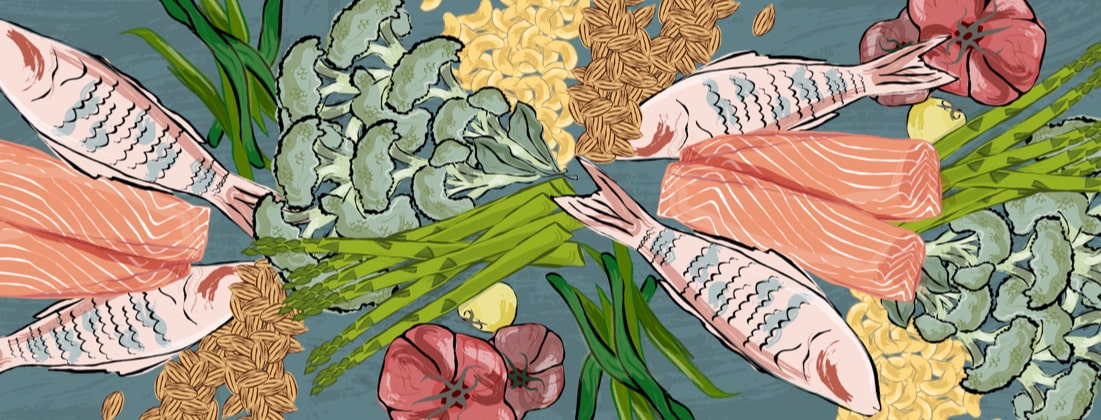An Anti-Inflammatory Diet for Psoriatic Arthritis: Foods to Eat and Avoid
When you have psoriatic arthritis, you're likely all too familiar with how it can affect your joints. The word inflammation seems to become an everyday word, and discomfort is the norm.
While it hasn't been scientifically proven that certain foods can affect your joints, many patients have claimed that an improved diet has helped to decrease inflammation.
How can a diet help with inflammation?
When it comes to what you're chowing down on, it makes sense that what you put in your body affects its inner workings. For example, foods high in omega-3 fatty acids are proven to help lower inflammation, while processed foods or foods containing sugar can increase inflammation.
This or That
Have you tried integrating the anti-inflammatory diet into your routine?
What's the relationship between weight and PsA?
Altering your diet can also be beneficial to your weight. Maintaining a healthy weight is essential for your PsA, as additional weight can place stress on your joints.
Rheumatologist Binita Sapkota, MD, from the Cleveland Clinic, states, "Obesity can increase trauma in the joints and in areas where tendons insert into the joint. Weight management is an essential component in the management of psoriatic arthritis."1
All of this can feel overwhelming, but it's not about making significant drastic changes - but starting with small little ones. As I said, inflammation is a big part of psoriatic arthritis management. Let's jump off from there.
What anti-inflammatory foods can you eat?
Ideally, you want to focus on eating anti-inflammatory foods to help tame flare-ups. According to Harvard Medical School, here are some anti-inflammatory foods to include in your diet.2
Were talking tomatoes and olive oil; green leafy vegetables, such as spinach, kale, and collard greens; nuts like almonds and walnuts; fatty fish like salmon, mackerel, tuna, and sardines and fruits, such as strawberries, blueberries, cherries, and oranges.
What does research say about this diet?
Claire Daien, MD, Ph.D., is a rheumatologist at the Regional University Hospital of Montpellier, France, and a professor at the university there. Daien explains, "Seventy percent of immune cells are located in the gut. This is why the quality of the food one eats so important."
Following a study by Dr. Daien on 300 adult patients with immune-mediated inflammatory disease, 44% changed their eating habits following their diagnosis. Of those patients, two-thirds (66%) who had modified their diet experienced a positive change.3
What foods cause inflammation linked to PsA?
Sugar! Sugar releases small proteins called cytokines that cause inflammation. Foods that cause inflammation include refined carbohydrates, such as white bread and pastries, french fries and other fried foods, soda, and other sugar-sweetened beverages.
Additionally, red meat (burgers, steaks), processed meat (hot dogs, sausage), and processed foods. Items like cereal and frozen dinners tend to contain trans fat, which can trigger inflammation. Don't forget certain dairy products, either!2
Featured Forum
View all responsesConsider swapping your dairy products for plant-based items like soy, almond, or coconut milk. Dr. Sapkota says, "These foods are known to increase inflammation, and they can also cause an increase in your weight, which is not good for psoriatic arthritis." 1
What other lifestyle changes can you make?
Exercise, weight management, lowering stress levels, and a good night's sleep are also essential to maintaining a healthy lifestyle and, in turn, healthier joints.
Always pay attention to your body. Remember that everybody is different, and people react differently to various changes in diet. There is never one right fit for everyone. You want to live the healthiest version of yourself, which doesn't end with dieting alone.
The Mediterranean diet for psoriatic arthritis
The Mediterranean diet focuses on eating fewer carbohydrates and red meat, which are big staples of the American diet. There are also fewer sugary foods. Mediterranean regions have been following this method of eating for years. No wonder they're healthier than us!
The Mediterranean diet focuses on eating: fruits, vegetables, healthy fats (like olive oil), seafood, legumes, nuts, and seeds. The Mediterranean diet is rich in omega-3 fatty acids in fish like salmon, and nuts and sources like flaxseeds and chia seeds. Omega-3 fatty acids help reduce inflammation and joint stiffness.
Can the Paleolithic diet help?
The Paleolithic diet is also known as the Paleo diet, and it consists of eating what humans back in the caveman era might have consumed some 2.5 million years ago. Anything you can hunt or gather rather than farm is part of the Paleo diet.
The Paleolithic diet focuses on eating: lean meats, fish, vegetables, fruits, nuts, and seeds. Foods to avoid include grains, legumes, dairy products, potatoes, refined sugar, and processed foods.
What about the vegetarian or vegan diet?
Eating vegetarian or vegan means cutting meat and fish and focusing on plants, vegetables, fruits, nuts, seeds, and grains. If you choose to include fish, this is also great for your PsA, but you would be considered to be on a pescatarian diet.
A vegan diet is a bit more strict. Like the vegetarian diet, this also excludes meat, poultry, fish, and anything an animal, such as eggs, dairy, and honey, could produce.
Could a gluten-free diet help?
A gluten-free diet is pretty self-explanatory, but this diet cuts out foods that contain the protein gluten. This includes grains such as wheat, barley, and rye.

Join the conversation